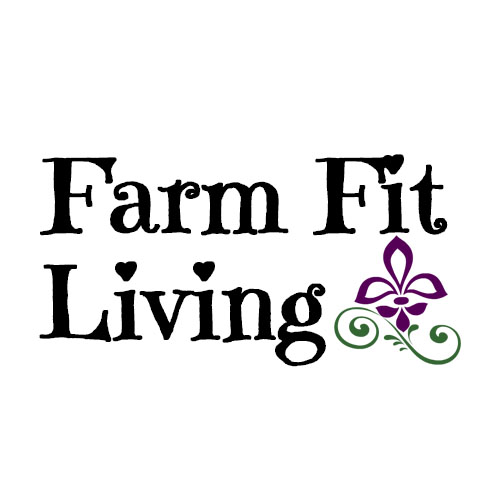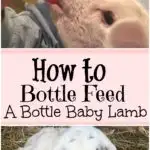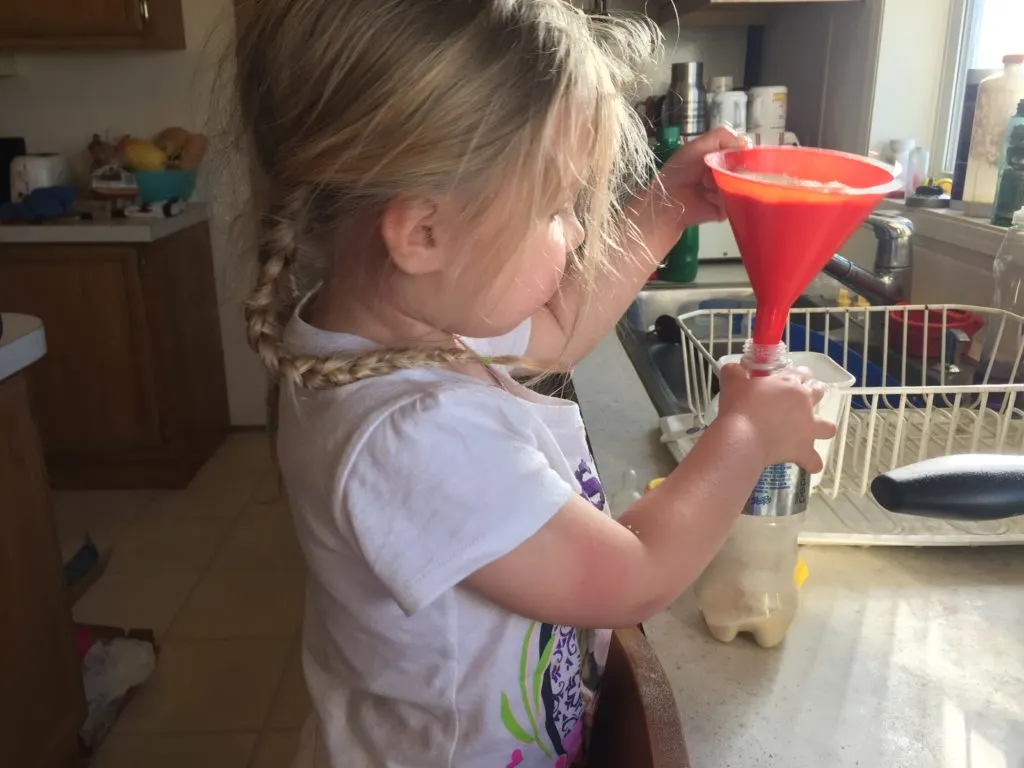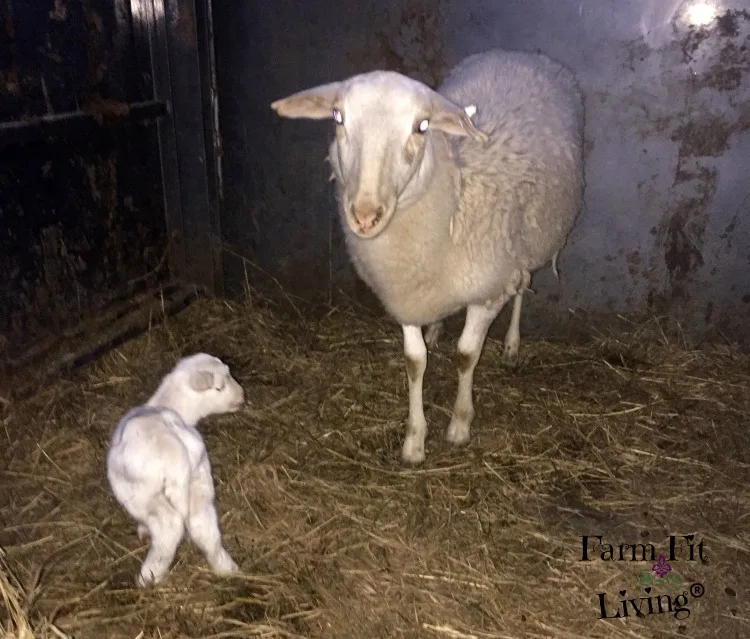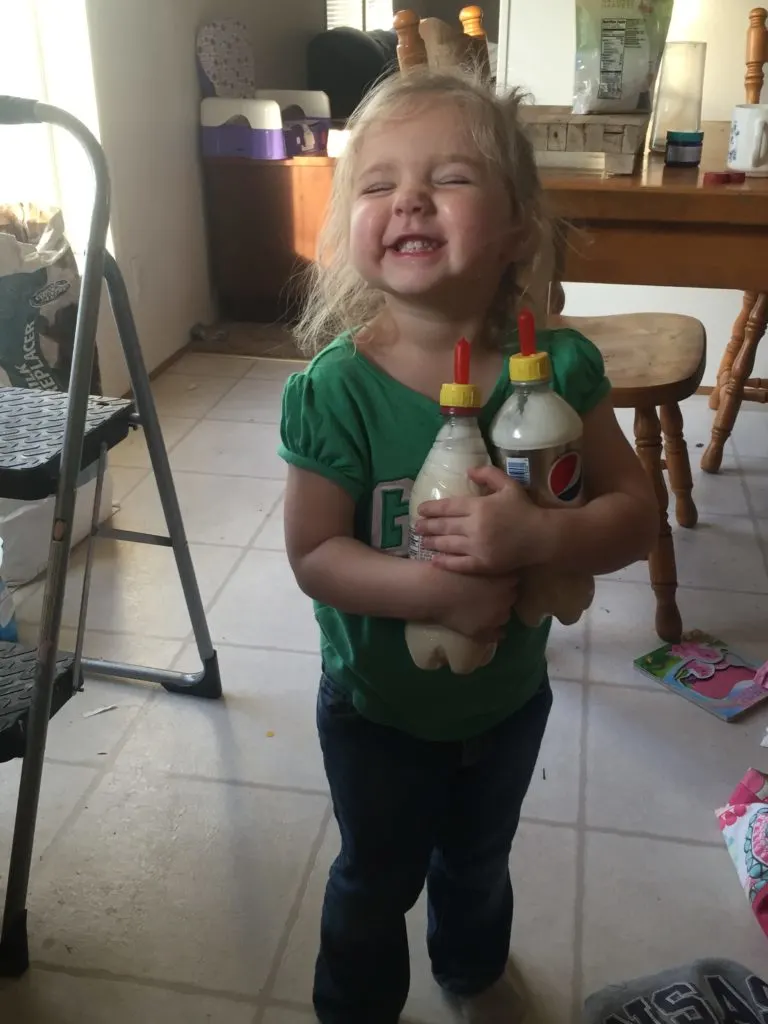Looking for information on how to bottle feed a lamb?
How to bottle feed a lamb is pertinent information. Because you just never know when the situation will arise for needing to take over the care of the bottle baby lamb. Young lambs can become sick, unwanted or orphaned.
And, I’m going to share with you what we do when one of our lambs becomes just that and needs us to care for it. Learning how to bottle feed a lamb is one of the most important skills that all successful sheep producers need to know.
First of all, I’m going to explain why this skill of learning how to bottle feed a lamb is so important.
Listen to the Podcast Episode Here:
This post contains Affiliate Links. This means if you click and buy, I might make a commission at no cost to you.
See my policy for more information
Why would you need to know how to bottle feed a lamb?
Because it’s one of the most important skills you have to know if you’re going to raise hair sheep. Learning how to bottle feed a lamb is just part of the journey of raising healthy lambs. It’s not always roses and butterflies when it comes to homesteading, farming or ranching.
You see, things happen. Again, not every lambing situation will be rosy and rainbows. You can’t always predict that every situation will turn out perfectly.
So, be prepared and keep learning new skills, such as how to bottle feed a lamb. Knowing this skill can really save a lot of little lambs. But, what kind of situations are we looking at? Next are some situations you might face which would lead you to be searching for “how to bottle feed a lamb.”
Why Hungry Lambs Would Need To Be Bottle Fed
There are a few situations where a lamb might need to be bottle fed by you in order for it’s survival:
- Maybe mom just doesn’t want it. She refuses to respond to the bonding process.
- Lamb was really cold after birth and became hypothermic. This results in weaker lambs that just need to be spoiled in a warm environment.
- Perhaps Mom doesn’t have enough milk to feed her own lamb.
- Or there are triplets and she can’t handle them all.
- Worst of all…mom died during labor. It’s hard but baby can be saved.
So, whichever the reason, you end up with a cute fluffy bottle lamb. Now, here’s what you need to be able to feed a bottle lamb.
What Bottle to Use
There are many options, but I’m going to share with you what I use and recommend.
So, my husband drinks a lot of soda pop in those 20 oz bottles. I keep those pop bottles, wash and sanitize them to use for bottle babies.
Then, I purchase pritchard nipples. When I was first starting out, I found the pritchard teat to be the most recommended nipple to use for bottle baby goats and lambs. Why?
Because, as I have also found, they are the rubber nipple that is most like a teat. I’ve used other nipples (the black ones) that are just too big. They may work for older babies but not for new ones.
Therefore, I’m advising you to start with the red Pritchard Nipples. Tip: Take a razor blade and gently slice open the top of the nipple. Do not cut as the hole will be too big and baby will get too much milk!
First Milk for a Newborn Lamb
The Very first thing a baby lamb needs in the first hours of life is Colostrum.
Colostrum is best if it comes straight from the ewe but if that’s not possible, a Colostrum Replacer can be used. Fresh colostrum can come from a different animal species as well, such as cow colostrum or goat colostrum. It’s all the same – But you need to make sure it is colostrum.
You can also use a Colostrum Supplement if the lamb is getting some of the ewe’s milk. A little bit is better than none – Her milk might just be slow to come in.
So, getting the lamb their colostrum in the first 24 hours of life is so important. It has all of the antibodies and nutrients a baby needs to help it thrive.
Feed the new baby every couple of hours because they won’t be drinking much yet. About 2-4 ounces on a regular basis is just about right for a newborn but do adjust accordingly based upon the size and needs of the lamb.
Different Options for Milk
So, pretend your lamb is older than 24 hours. It’s time to switch over to milk. Now, the dilemma of what milk to feed the bottle baby lamb. Decisions, Decisions. There are so many. And everyone will tell you that their way is best. Do listen to suggestions but make a decision on ONE option for a milk replacer you can be happy with for the next 8-12 weeks.
Here’s the truth: The truth is that there are a few different options that might work for your budget, time and peace of mind. So, here’s the break down of the three main options for what to feed bottle baby lambs.
1. Powdered Milk Replacer
First of all, I will tell you that powdered milk replacer is just fine to use. Don’t let anyone tell you that it’s not. If it wasn’t, you wouldn’t find it in the farm stores because NO ONE would be buying it.
BUT, with that said, you need to know what to use and what not to use when it comes to powdered milk replacer. The powdered milk replacer needs to be MILK based like this one…not SOY based. That is very important to the success of using a milk replacer.
I’m a soybean farmer and love soy…but it’s not good on new baby lambs or goats’ tummies. So, milk based milk replacer is what you want. I’ve raised many many kids and lambs on a milk based powdered replacer with success.
Of course, there are some things to keep in mind when it comes to lamb milk replacer. The first steps is to make sure you completely read the mixing and feeding instructions on the bag of milk replacer. This is so important to get right. One of the reasons milk replacer can get a bad rap is because the milk wasn’t mixed correctly or the baby was fed too much. So, following the feeding schedule is so important.
The good news is: Most feeding schedules are pretty much the same as you’ll find. I’ve created a sample feeding schedule you can follow for success.
If you’re completely against the powdered milk, there are other options. May I suggest whole cow’s milk or goat’s milk as many others will. Let’s discuss.
2. Whole Cow’s or Goat’s Milk
Ok, so I have bought pasteurized whole milk from the store to feed a bottle baby lamb. And I know many other producers have as well. In fact, if you ask the question in any Facebook Group, whole cow’s milk is the most popular answer you will receive. Why?
Because it’s an easy option to feed bottle baby lambs. Not necessarily the best option. But really, all you do is buy, twist and pour into the bottle. No mixing required here.
And you can also try to get fresh raw milk for lambs. I have some dairy farmer friends who have always fed whole cows milk or dairy goat milk to their bottle baby lambs. Now that we have dairy goats, we typically will feed dairy goat milk to our baby lambs if the dairy goats are in milk. This milk is straight from the animal and raw. Their lambs have done well on that whole cow’s milk.
But the one thing you want to make sure is that your not going to be giving milk infected with certain diseases, such as Johne’s Disease. Many herds have been tested and Johne’s free but you still need to keep that in mind when obtaining milk for the baby.
So, if you have dairy farmer friends nearby or the budget to buy whole cow’s milk – Go for it! Also, goats milk works, of course. Again, do what works best for you.
Finally, there’s a third option.
3. Homemade Milk Replacer
Finally, we come to the whole milk/buttermilk/etc. option. The gourmet homemade version for only the elitist and most spoiled lambs. And I’ve used it so I can recommend it. Plus, the person who created it is just awesome!
I’ve had this really amazing recipe for bottle babies for years. It is a no-fail. Here it is:
- 1/4 Cup Whipping Cream
- 1 large egg
- 1 cup non fat dry milk
- 3 Cups Water
Mix in a blender. It makes 30 ounces. If you need a larger batch, double everything EXCEPT whipping cream. Instead, use 1/3 cup whipping cream. Read on for feeding instructions.
To triple this recipe:
- 3 Eggs
- 3 Cups Powdered Milk
- 1/4 Cup Whipping Cream
- And 1/3 Cup Whipping Cream
- 2 Cups Water
Mix in a blender and then add to 7 cups of water. This mixture makes 3/4 of a gallon of milk replacer the lambs will be loving on.
And here’s another homemade recipe that I have tried with success:
– 1 Gallon Whole Milk
– 1 Cup Whole Buttermilk
– 12 oz Can Evaporated Milk
Pour off 2 1/2 cups of the whole milk. Add Buttermilk and Evaporated milk to the whole milk. Mix well. Feeding Instructions are below.
So, there you have it. The three different milk options. But before I move on to feeding instructions, I want to share a little bit of info about grafting a bottle baby.
Grafting
So, I’ll get back to bottle feeding in just a second. But, I wanted to just mention the possibility of grafting a bottle baby onto a ewe that lost her baby. It’s totally possible in just a day.
By skinning the dead baby and tying it onto the bottle baby, the grafting process will take much less time. I’ve achieved success doing this with goats and I’ve even written about it!
Read how to graft a kid onto a doe using fresh skin and baling twine.
This can totally be achieved with sheep as well – I just have not been given the opportunity yet to try it on the sheep side. But I know of many other producers who have successfully skinned lambs and grafted babies onto moms using the skin.
Ok, so back to bottle feeding. Let’s talk about how much to bottle feed a lamb.
How Much to Feed a Lamb
This is the most important part of this article. Above, I’ve discussed a few options to feed. Any of those are great options but you will not find success in any of them if you don’t feed it correctly.
So, basically the safest bet is to go by the weight of the lamb. The rule of thumb is about 20% of their body weight. If you need a scale to purchase to weigh lambs, here are a few options:
So, with that said, here are some feeding recommendations I use:
- 1-2 day old lambs should receive 4 to 6 ounces 4 times per day.
- 3-7 day old kids: 8-10 ounces 3 times per day.
- 1-2 week old kids: 12-14 ounces 3 times per day.
- 3-6 week old kids: 16-20 ounces 2 times per day.
- 7-8 week old kids: 20 ounces 2 times per day. This is a full bottle.
And at the 8-week mark, the lambs are ready to be weaned. You can gradually begin to cut back on milk as long as the lamb is eating feed and hay and drinking plenty of water.
Finally, allow two weeks of gradual decrease in milk before fully weaned. Slow is better when it comes to weaning a bottle baby. Lambs can be really stubborn, but as long as they can become independent from milk, they will be fine.
Stubborn Lamb
So, we’ve discussed what could happen to cause a lamb to become unwanted or orphaned. Things just happen. And what makes it worse is when that lamb will not for whatever reason take a bottle from you.
Stubborn lambs can be difficult to start on a bottle. No matter what age, if the lamb has had mother’s milk, that’s what it will want. Because, I mean, there’s nothing better than mother’s milk, right?
So, you need to be just as stubborn. Because baby has to eat to live.
Therefore, be strict and firm but gentle when encouraging the baby to eat from a bottle:
- Hand Placement: Cup the head with one hand. Be sure fingers are on the throat gently so you can feel if the lamb is swallowing. With the other hand, hold the bottle and gently push the nipple into the lamb’s mouth. Use your fingers to hold it in.
- Let the lamb take breaks every so often. Then, try again.
- Keep trying until the lamb has drank it’s recommended amount of milk. See above recommendations.
Also, when you’re transitioning a lamb onto a bottle, you need to have some probios on hand. Give about 2 CC every 6 hours to keep the tummy bacteria balanced. I really like this probiotics.
Finally, a bottle lamb should be cared for properly. Next is some tips for housing a bottle lamb.
Where Should a Lamb Be Housed?
So, we’ve discussed how to bottle feed a lamb:
- What to feed
- How to feed
- Why to feed
- When to feed
Now, I want to discuss where. What else a lamb may need to be comfortable. If it’s cold out, keep in mind that the lamb will have no one to snuggle with. You really shouldn’t put an orphan lamb into a pen with mothers and babies. Why? Because it could get butted around and hurt. Maybe even killed.
It’s best (in my opinion and experience) to keep orphan babies separated from the rest of the herd. Bottle babies should have a small and draft free place to stay warm and safe.
Also, provide warm and clean bedding for the lambs. The place that is best for you and your lambs. I have a special place in our barn, but in extreme cold conditions it’s not the best locations.
In extreme situations where a lambs is cold, I’ve had babies in the warmest place I know I have: My kitchen. I use a large kennel like this one with bedding to house it for a couple of weeks until I know it can regulate it’s temperature on it’s own.
I’ve also housed lambs in a large kennel in the basement. Another warm place to just protect them from the cold weather that could kill them if they become hypothermic. So, now you can use what you have to find the best housing option for your bottle baby lamb.
Finally, Have Fun With Your Bottle Baby Lambs!
Because they are fun! There’s nothing more bouncy and fluffy than a bottle baby lamb running to it’s bottle.
And the hardest part isn’t how to bottle feed a lamb. The hardest part is getting it started. Or knowing how much to feed it. So, I hope that what I shared with you today will help you learn all there is to learn about how to bottle feed a lamb.
Good luck and enjoy the journey of raising hair sheep! And all that comes with it.

